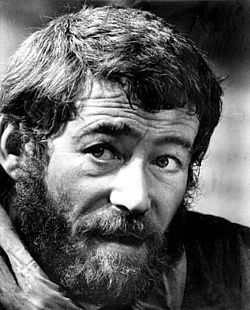Theatre and film

Henry II appears as a character in several modern plays and films. He is a central character in James Goldman's 1966 play The Lion in Winter , set in 1183 and presenting an imaginary encounter between Henry's immediate family and Philip Augustus over Christmas at Chinon. The 1968 film adaptation communicates the modern popular view of Henry as a somewhat sacrilegious, fiery and determined king although, as Goldman acknowledges, Henry's passions and character are essentially fictional. [1] [2] The Lion in Winter has proved to be an enduring representation of Henry, being turned into an Academy-Award-winning film and remade in 2003 for television.
The relationship between Henry and Thomas Becket has been a rich source for dramatic interpretation, for example as early as 1923 in the film Becket . In the play Becket by Jean Anouilh, (filmed in 1964), the character of the King is deliberately fictitious, driven by the need to enhance the drama between them. [3] The Becket controversy also forms the basis for T. S. Eliot's play Murder in the Cathedral , where the tensions between Henry and Becket allow a discussion of the more superficial events of Becket's death and Eliot's deeper religious interpretation of the episode. [4] Murder in the Cathedral was adapted for a feature film in 1951, directed by George Hoellering: in this version Alexander Gauge played Henry. [5]
Henry II appears as a character in the 1884 play Becket by Alfred, Lord Tennyson. [6] In the 1924 adaption of Tennyson's Becket, A.V. Bramble played Henry II.
Beth Flintoff has written a trilogy of plays which feature Henry II, his mother Matilda and grandfather Henry I . These are fictionalised accounts of historic events. The first, Henry I of England, [7] [8] sets the scene by including the foundation of Reading Abbey in 1121 and the second Matilda the Empress shows the future Henry II as a child during The Anarchy period after Henry I's death when Matilda and her cousin Stephen were rivals for the succession. [9] In the concluding part, Henry II, which was first performed in October 2018 at Reading's Minster Church of St Mary the Virgin, the king is the main focus. The action of the play is set over the Easter weekend of 1164 when Thomas Becket officiated at the dedication of the then-complete Abbey, of which Henry II was an important patron. [1] [10]